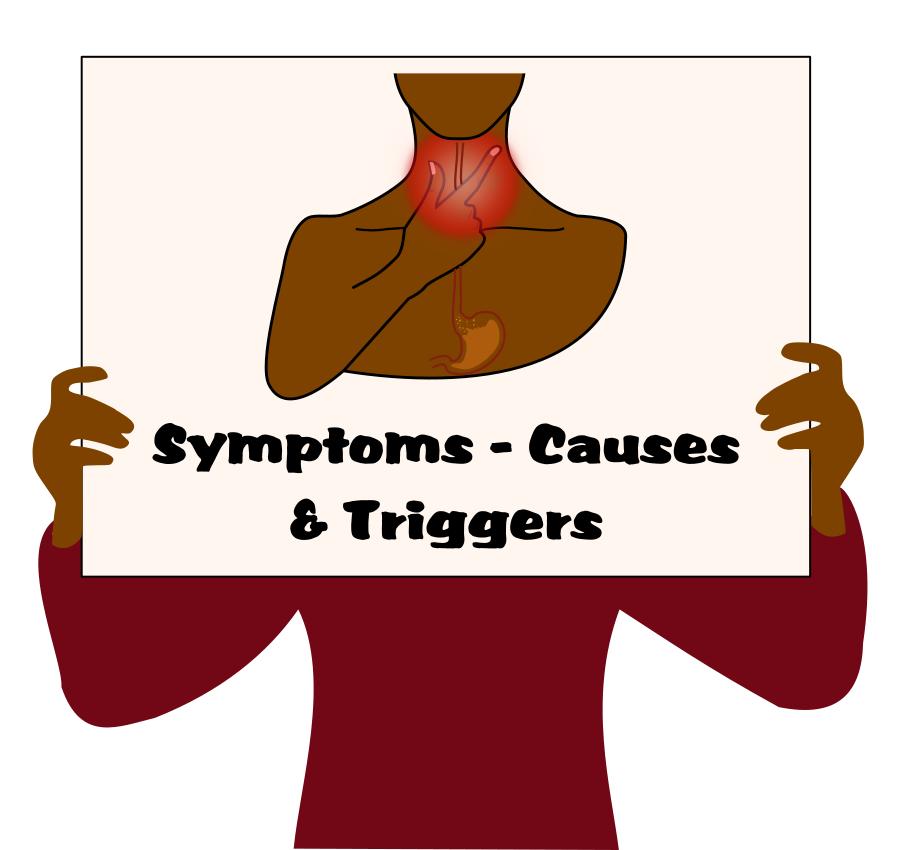
What To Look For
Symptoms - Causes- & Triggers
SYMPTOMS:
Bloating
Bloody or black stools or bloody vomiting
Burping
Regurgitation Dysphagia -- the sensation of food being stuck in your throat
Hiccups that don't let up
Nausea
Weight loss for no known reason
Wheezing, dry cough, hoarseness, or chronic sore throat
Upper abdominal pain
CAUSES:
Consuming alcohol
Caffeine
Being exposed to secondhand smoke
Eating large meals
Consuming high-fat or fried foods
Not all are direct causes, however some of these can certainly be a trigger for it.
Asthma medication
High blood pressure medication
Antidepressants
Antihistamines
Pain relievers
Sedatives
Please consult your doctor if you are experiencing Acid Reflux Symptoms after taking any medication.
KNOW YOUR TRIGGERS:
The best way to prevent acid reflux from occurring is to discover what your triggers are. They can be different for everyone so plan to spend some time troubleshooting. Don’t assume the same reason someone you know suffers from acid reflux is why you do. The leading cause of acid reflux has to do with the foods a person consumes. Take the time to document when you get acid reflux and what foods you have eaten that day.
Doing so will help you to identify any patterns. For example, if you get acid reflux after eating fresh oranges there may be too much acid in them for your body to digest. If you get acid reflux after consuming spicy foods you may need to change what you use to prepare your meals with.
Once you start finding your trigger foods STAY AWAY FROM THEM, substitute them with something healthier and you'll start to see a change in the way you feel. Yes, it's that easy to start finding some relief.
PREVENTING TRIGGERS:
Pay close attention to how certain foods affect you. This is important because you don’t want to end up repeating mistakes over and over again. For example, if you often cook with garlic, it may be what is causing your acid reflux. Changing to another spice or just eliminating it from your cooking can make all the difference.
Pay close attention to how much you eat. Too many of us continue to eat just because food is in front of us. Portions at restaurants have gotten out of control as well. Stop eating when you are full and you will find that you suffer less from acid reflux. It can help you to lose weight as well which puts pressure on the stomach. When you shed some pounds you will discover that there is less pressure.
Pay close attention to how often you are eating. Traditionally three meals and two snacks are recommended. However, for those that suffer from acid reflux eating six small meals can help the body to digest the foods easier. Make sure that you don’t eat for the last couple of hours at night before you go to bed either.
Chewing Gum is a very simple and effective way for you to avoid triggering acid reflux. It naturally allows your body to produce more saliva and that counteracts that acid in your stomach. There are many flavors of gum you can chew too so try some new flavors. Try to chew gum for at least 30 minutes after each meal in order to get the best results.
Too much dairy. This may seem ironic as many people tell you to drink a glass of milk to prevent it. There are plenty of acids in various types of dairy so consume it in moderation. If you are worried about getting enough calcium then take daily supplements.
Sugar and Acid Reflux. The dreaded Sweet Tooth. Chocolate is a prime example of a sweet that can trigger acid reflux. While you may want it from time to time limit the amount. You also want to consume it early in the day so it doesn’t cause nighttime acid reflux. To satisfy your sweet tooth eat sugar-free jello with whipped cream on it. You can also consume a few cookies, licorice, or suck on hard candies that are sugar-free.
Check out the 5 - Keys to Victory...
Disclaimers: Please remember to consult your family Doctor or the proper physician BEFORE making any type of diet, medication, or lifestyle changes.
